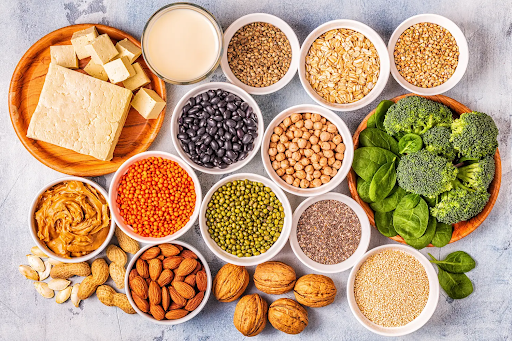Everything About Healthy Food: Benefits of Checking Out Plant Based Options
The discussion surrounding plant-based diet regimens has actually acquired substantial attention in recent times. Lots of individuals are exploring the possible wellness benefits, nutritional benefits, and environmental influences related to these dietary choices. As individuals come to be extra knowledgeable about their food's impact on wellness and sustainability, inquiries arise about the practicalities of taking on such a way of life. What details changes can one anticipate, and just how might these choices improve not only individual health but also the planet's future?
Recognizing Plant-Based Diet Regimens
Lots of people link plant-based diets primarily with vegetarianism or veganism, these diets can include a wide array of eating patterns that prioritize entire, minimally refined plant foods. Such diet plans often include fruits, vegetables, whole grains, vegetables, nuts, and seeds, while limiting or removing animal items. This adaptability permits individuals to customize their dietary choices according to personal preferences and dietary demands. Some might embrace a mostly plant-based diet while still sometimes consuming meat or dairy, commonly referred to as a flexitarian approach. The focus remains on integrating more plant foods, which can cause a varied array of meals and flavors. Understanding these different interpretations of plant-based consuming is crucial for valuing its ease of access and appeal in contemporary food culture.
Health Advantages of Plant-Based Foods
The health and wellness advantages of plant-based foods are substantial, providing a nutrient density advantage that supports total well-being. Research study shows that these foods can enhance heart health and play a necessary role in reliable weight monitoring. By including extra plant-based choices, people might improve their nutritional choices and promote long-lasting wellness.
Nutrient Density Advantage
Nutrient thickness plays a crucial role in the health and wellness advantages of plant-based foods, making them an engaging choice for those looking for a balanced diet regimen. Plant-based foods, such as fruits, vegetables, vegetables, nuts, and entire grains, are typically rich in crucial vitamins, minerals, and anti-oxidants while being reduced in calories. This high nutrient density enables individuals to eat less calories while still meeting their nutritional requirements. In addition, these foods are packed with dietary fiber, promoting digestion health and wellness and helping in weight administration. By including nutrient-dense plant-based alternatives, consumers can boost their total health and wellness, sustain their body immune systems, and minimize the risk of persistent illness. Ultimately, the nutrient thickness of plant-based foods highlights their importance in a health-conscious way of living.
Heart Health And Wellness Improvement

Weight Management Assistance
In addition to promoting heart wellness, a plant-based diet plan can considerably assist in weight management. This nutritional method emphasizes whole foods such as fruits, veggies, legumes, nuts, and entire grains, which are generally reduced in calories and higher in fiber compared to animal-based items. The high fiber content aids increase satiation, reducing general calorie consumption. Additionally, plant-based diet regimens are typically abundant in vital nutrients while reduced in unhealthy fats, making it much easier to maintain a healthy weight. BBQ Sauces. Study indicates that individuals that take on a plant-based lifestyle tend to have lower body mass indexes (BMIs) and experience even more effective weight loss compared to those who take in meat-heavy diet regimens. Welcoming plant-based alternatives is a strategic choice for effective weight management.
Nutritional Value of Plant-Based Components
Plant-based components are rich in vital nutrients, using a varied variety of vitamins, minerals, and anti-oxidants that add to general health and wellness. A comparison of protein sources reveals that while animal items are often considered as premium, many plant-based options provide ample healthy protein and various other helpful substances. Comprehending the nutritional value of these ingredients can help people make educated nutritional options.
Important Nutrients in Plants
Nutrient-rich ingredients found in plants supply a varied variety of vital minerals and vitamins that contribute greatly to total health and wellness. These components are rich in vitamins A, C, and K, which sustain immune function, vision, and blood clotting, specifically. On top of that, plants offer important minerals such as potassium, magnesium, and calcium, critical for heart health and wellness, muscle mass feature, and bone stamina. The presence of fiber in plant-based foods help digestion and advertises a healthy gut microbiome. Anti-oxidants, found perfectly in veggies and fruits, assistance fight oxidative tension and reduce swelling. Moreover, lots of plant foods are low in calories yet high in nutrients, making them an exceptional choice for those looking for to maintain a healthy weight while making certain optimal nutrient consumption.
Comparing Protein Resources
Healthy protein sources vary considerably in their dietary profiles, with plant-based ingredients offering unique benefits. Unlike animal proteins, which often have hydrogenated fats and cholesterol, plant proteins tend to be reduced in these undesirable components. Legumes, nuts, seeds, and entire grains are rich in important amino acids, fiber, vitamins, and minerals. For example, lentils give high protein content along with considerable iron and folate, while quinoa is a full healthy protein, offering all 9 vital amino acids. In addition, plant-based proteins are usually gone along with by anti-oxidants and phytochemicals that support total health and wellness. The change to plant-based protein resources not only improves dietary intake yet also lines up with lasting dietary techniques, decreasing ecological impact and promoting lasting health advantages.
Ecological Impact of Plant-Based Consuming
As recognition of climate modification expands, lots of individuals are checking out lasting nutritional choices site link that can considerably decrease their environmental footprint. Plant-based eating has become a substantial contributor to decreasing greenhouse gas exhausts, which are primarily related to livestock manufacturing. The farming of fruits, grains, legumes, and vegetables commonly requires fewer resources, such as water and land, compared to animal farming. Furthermore, plant-based diet plans can go now bring about lowered logging, as much less land is required for grazing animals or expanding pet feed. By changing in the direction of plant-based options, consumers can sustain biodiversity and advertise much healthier ecosystems. In general, embracing plant-based eating not only benefits personal health yet additionally stands for an essential action towards ecological sustainability and preservation efforts.
Overcoming Common Misconceptions
While many individuals identify the advantages of a plant-based diet regimen, a number of mistaken beliefs commonly prevent them from completely accepting this lifestyle. A common idea is that plant-based diet regimens lack sufficient healthy protein; nonetheless, many plant sources, such as legumes, nuts, and tofu, provide enough healthy protein. Furthermore, some assume that this diet regimen is pricey, when as a matter of fact, staples like beans, rice, and seasonal veggies can be quite affordable. One more mistaken belief is that plant-based eating is extremely limiting, whereas it in fact supplies a diverse range of tastes and foods. Many fret that a plant-based diet may lead to shortages, yet with correct planning, people can obtain all essential nutrients, including minerals and vitamins, while taking pleasure in a wide range of delicious meals.
Tips for Transitioning to a Plant-Based Way of living
Making the shift to a plant-based way of life can be an improving experience, though it typically requires some advice to navigate the preliminary adjustments. First, people are encouraged to begin gradually, integrating even more fruits, veggies, legumes, and entire grains right into their dishes while decreasing meat and dairy intake. Dish preparation is essential; preparing an once a week food selection can help alleviate the change and prevent last-minute unhealthy selections. Discovering brand-new recipes and cooking techniques can additionally maintain and improve the experience enjoyment regarding plant-based consuming. Furthermore, joining support teams or communities can offer motivation and share important ideas. Lastly, remaining educated regarding nourishment assurances well balanced dishes, protecting against shortages while cultivating a healthy and balanced, enjoyable plant-based way of living.
Delicious Plant-Based Meal Ideas
Discovering delicious plant-based meal concepts can motivate individuals to accept an extra nutritious diet. One prominent alternative is a hearty quinoa salad, featuring cherry tomatoes, cucumber, and a spicy lemon-tahini clothing. One more fave is a tasty lentil stew, packed with carrots, celery, and aromatic natural herbs, perfect check out here for a reassuring supper. For morning meal, over night oats made with almond milk, chia seeds, and topped with fresh berries offer a healthy begin to the day. In addition, a vivid vegetable stir-fry with tofu and a variety of colorful veggies can be a quick yet satisfying dish. Luscious avocado salute on whole-grain bread, sprinkled with spices and seeds, supplies a basic yet tasty treat. These dishes display the variety and splendor of plant-based eating.

Regularly Asked Questions
Can a Plant-Based Diet Regimen Offer Sufficient Healthy Protein?
The question of whether a plant-based diet plan can give sufficient protein is usual. Numerous sources, including beans, nuts, seeds, and entire grains, can meet protein requires efficiently, sustaining a healthy and well balanced diet plan for people.
Are Plant-Based Diets Ideal for Children?
The viability of plant-based diets for kids relies on cautious planning. Appropriate nutrients must be ensured, consisting of minerals, healthy proteins, and vitamins. With appropriate advice, such diets can support healthy and balanced growth and advancement in kids.
Just how Do I Eat in restaurants on a Plant-Based Diet plan?
Eating out on a plant-based diet includes looking for dining establishments with diverse menus, requesting alterations, and exploring vegan-friendly options. Planning in advance and connecting nutritional preferences can enhance the eating experience while preserving nutritional selections.
What Prevail Allergens in Plant-Based Foods?
Common allergens in plant-based foods include soy, gluten, nuts, and seeds - Plant Based Beef. Individuals complying with a plant-based diet plan must know these irritants and read labels thoroughly to prevent negative responses and guarantee safe usage
Can Plant-Based Diets Aid With Weight Loss?
Research suggests that embracing a plant-based diet plan may help with weight-loss because of its normally reduced calorie thickness and higher fiber material. This combination can enhance satiety, aiding people handle their caloric intake effectively. Many individuals link plant-based diet regimens generally with vegetarianism or veganism, these diet plans can include a wide range of consuming patterns that focus on whole, minimally processed plant foods. Nutrient thickness plays a crucial duty in the health and wellness benefits of plant-based foods, making them a compelling selection for those looking for a balanced diet regimen. Plant-based diet regimens have been shown to markedly boost heart health and wellness, as they typically include elements that sustain cardiovascular feature. In enhancement to promoting heart wellness, a plant-based diet plan can considerably assist in weight administration. A common idea is that plant-based diets lack sufficient healthy protein; nevertheless, numerous plant resources, such as legumes, nuts, and tofu, give sufficient protein.